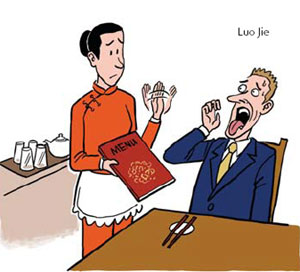A happy group of foreigners gather at the door of an exotic Sichuan restaurant and a waiter leads the party of five to a lovely hand-carved wooden table.
Pictured menus are handed out and fingers point to the dishes of desire. "One of them and two of them," someone says, even throwing in the odd nage (that) zhege (this) for good measure.
Drinks are the next items on the dinner ordering agenda.
Beer, cola, and everybody wants water, but the waiter is having a hard time understanding the request for ping shui (bottle water).
This is the most basic beverage on the planet, why is ordering water always so hard?
The dinner party's Chinese water torture begins.
"Wo yao ping shui (I want bottle water)," one says.
The waiter looks vacant and ping shui (bottle water) is repeated three of four more times.
Someone adds a bing (cold) to the ping, and all these bing ping, bing ping sounds like a pinball machine.
The waiter is still unclear about all these pings and bings and does not understand a thing.
"Maiyou (not have)," he says.
"What do you mean you don't have water, or course you do, there is a bottle on that table right there," one fellow will say loudly in English thinking a higher volume will somehow solve the problem.
But now the waiter, who is trying to process the last sentence of foreign gibberish, is really confused.
The thirsty diners, who can see bottles of water on many tables, are also baffled.
Water, water everywhere and not a drop to drink.
Another frustrated member of the party leaps from the table like a jack-in-the-box, rushes to the nearby fridge, opens the glass door, grabs a bottle of water and passes it to the waiter.
"Ping shui," he says holding up his hand indicating five waters.
"You, you (we have, we have)," says the waiter.
"This happens every time at every restaurant I go to ... why can't I order water?" says a diner.
Why is a newcomer's most baffling Chinese challenge is ordering a bottle of water in a local restaurant?
All expats and most tourists have the ability to say these simple words - shui (water) using the up and down third tone - but many get bamboozled by the details which I have described.
There is a solution.
The problem lies in the use of the word ping, the measure word for bottle. Saying ping on its own means nothing unless a number precedes this measure word and saying bing ping, (and probably using all the wrong tones) sounds plain silly.
If the group had said, "women yao wu ping shui (we want 5 bottles of water), the waiter would have immediately understood and there would be peace on the land.
Saying ping shui on its own just doesn't cut it.
It's like going into clothes store in an English-speaking country and asking for a "pear sack", rather than one pair of socks.
Requesting tea - cha applying the rising second tone - can be equally tricky. Many restaurants provide "mian fei (no charge)" tea, and the pot will arrive soon after the order.
But during the food ordering process, we often confuse the waiter by asking for tea, which is already part of the deal.
The waiter will ask about the kind of tea we want, and most of us say green tea, or "lu cha".
"Mei you (no have)," the waiter will say to our frustration because we can see every other table with a pot of tea and we want what they have.
But the restaurant probably doesn't have what the "green tea" you asked for.
It may have five other types, including the free tea it offers, but it doesn't have the "lu cha" you've asked for.
(China Daily May 4, 2009)